
|
|
 |

|


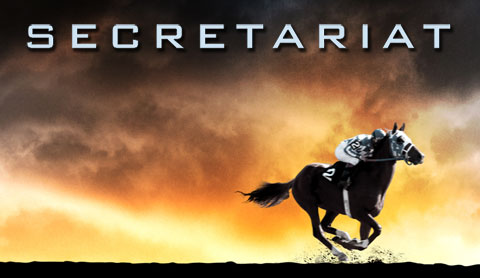
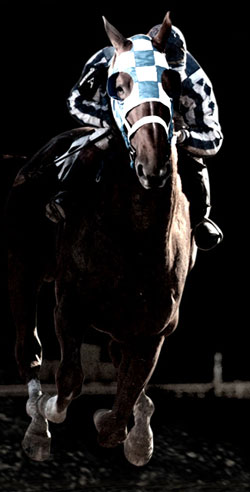
M.R. Dinkins Secretariat, of course, is about the quintessential equine's quest for racing's rare grand slam, the Thoroughbred Triple Crown: the Kentucky Derby, the Preakness and the Belmont Stakes. The consort in this 1973 Sport of Kings was enterprising Penny Chenery Tweedy. She harnessed her assets to her ambition and bet all her money on a horse. Literally. Secretariat: The Making of a Champion is reporter William Nack's chronicle of the super-steed and the four pivotal persons closest to him: his owner, groom, trainer and jockey. Obsessed with the champion, Nack recorded his evolving career and later joined Mike Rich to write a script. Director Randall Wallace then assembled the movie. Chenery's dad, incapacitated by accelerating senility, owned a once-successful-but-now-failing racehorse breeding business. Despite her family's dogged determination to sell, the lady saved the farm. Saddled with two worlds, she bucked convention by rearing kids in Colorado and raising horses in Virginia. She jet-setted between her Tweedy family and the Chenery family farm. Handicapped as a woman on male turf, Chenery used her considerable cajones to charge full tilt into the macho tradition. 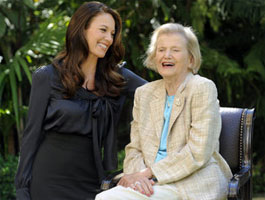 Diane Lane & Penny Chenery In 1983 after unprecedented wins, including Secretariat's Crown, the Queen of Sweeps became the first woman to be admitted to the 89-year-old good-ole-boy Jockey Club. While the real Penny Chenery Tweedy was on the film set for guidance, there was still plenty of jockeying of the verity. A movie based on a true story is a movie laced with fiction, so you watch it suspiciously and hope the actors will transport you beyond the the tenacious tentacles of skepticism. Who cares?, you ask. Well, many do because truth can be so much more seductive and inspiring than fiction. We can accept the twists and tweaks of movies about bygone eras, because they are clearly warped personal interpretations woven into a weft of semi-facts and demi-dates. But for modern history, it's often unsettling, unnecessary and unwarranted to manipulate truth for the sake of show biz. However, the filmmaker and Secretariat's hominoid contemporaries concur that the animal was sentient of his successes and failures, his challenges and challengers. He had the drive to race and thrived on victory. 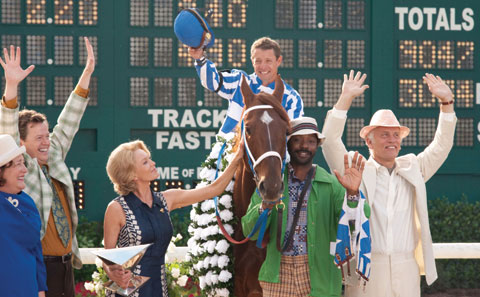
Allegedly crowds and cameras aroused a certain vanity in him as he miraculously morphed from dark horse to high horse by lapping around tracks faster than the fellow field. The quandary of concocting this screen saga is that we all know the ending: Secretariat wins. We have newspaper headlines. We know who he beat and by how much he won; we have TV interviews with the owners; and we have books and Wikipedia biographies. But how do you generate and distinguish excitement four times for four different races? And how do you make old news new again? Hire good story tellers. Done. Hire a fine cinematographer and editor. Done. And hire outstanding actors. Done. 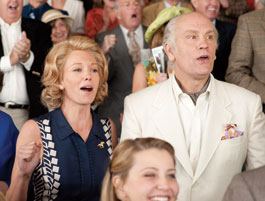
Diane Lane, perfect in her perfectly coiffed do, doubles as the 60's Donna Reed with a yen for trophy horses. Lane enacts Chenery effortlessly. She can deliver lines with only her eyes. John Malkovich is the eccentric trainer Lucien Laurin. Who does aberrant better? Real jockey Otto Thorwarth quietly exudes his role as triumphant rider, Ronnie Turcotte. And I love the astonishingly versatile-magnetic-charismatic chameleon, Nelsan Ellis, the groom Eddie Sweat. (Tune into True Blood to see his heart and his range.) 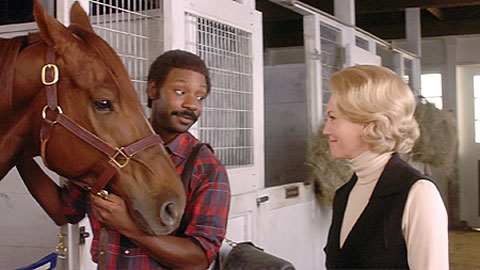
Husband and reluctant father, Jack, (Dylan Walsh), her debilitated dad (Scott Glenn), and recalcitrant brother (Dylan Baker) are joined by an august cast that includes James Cromwell, Margo Martindale, Nestor Serrano and Fred Dalton Thompson. Now watch the sumptuous scenery, the camera close-ups, the cute kids, the chiaroscuro lighting, the emotive clashes, the exquisite colts and the equestrian duels. You too will be cheering Secretariat's already-run-and-won races and this mostly winning movie. 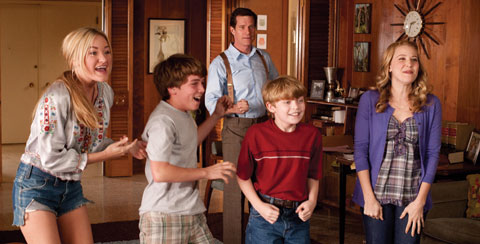
Bonus Features 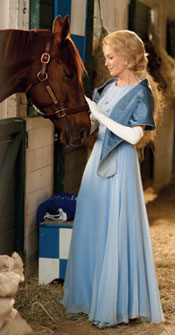 Penny Chenery Tweedy was ahead of her time. She went to grad school, had a commuter marriage, kept her maiden name for business, ran a successful company and shattered several glass ceilings. Contrary to the movie, she grew up with horses, studied business at Columbia University, already won a Double Crown in 1972 with her horse Riva Ridge, and - tsk tsk - divorced a few times. These were among the omissions and distortions. Yet in a gratifying Bonus Extra, Director Wallace asks the 88 year-old Chenery Tweedy to comment on specific scenes that he purposely fictionalized to convey what he perceived as the essence of truth. (We watch them, too.) The confab quells some questions and dispels many misgivings about Secretariat masquerading as history. Chenery dreaded seeing the movie, but she embraced the poetic license. So can we. The movie mysteriously opens with a Biblical reading of "Job" by Lane, and closes with Amanda Michalka (who plays daughter Kate Tweedy) singing a quasi hymn written by Director Wallace. (Her music video is among the Extras.) It is Kate (Michalka) who provides the only reference to the turbulent times from which Secretariat's crushing records offered a welcomed escape. But don't expect to see or hear any mention of the bloody war protests or raw race riots that riveted society at the time. They are not part of Wallace's pretty picture, and certainly not part of a pretty flic from Disney. And God forbid there be any mention of gambling in a tale told at a racetrack. Not one tic-tac at the clickety-clack...Really? 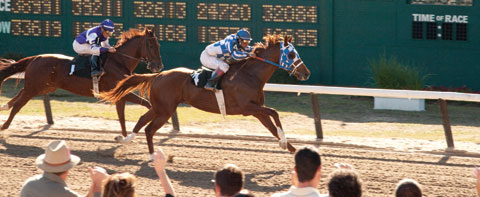
If you want to know why, Southern Baptist Wallace explores his motives, modus operandi and more in his Director's run-along commentary. Some period talking heads, (except the real Eddie Sweat), seemed more like fillers. (Just my opinion.) And there are the mandatory deleted scenes. Skip the gratuitous irritating aggravating ad for 3D movies and 3D-ready TV sets. Enough already. (The DVD just opened with another harassing 3D promo.) Also skip "Info." The Multi-Angle computer simulation of races slightly clarify the actual events. (The movie does this very well - with no assist from CG). For viewers interested in how they shot the astonishing races, this is your informative source segment. But it's the original TV footage of the historic runs that most enhance the DVD experience and make owning the Blu-ray better than any subscription service - and depending on the size of your HDTV, perhaps better than the theater experience. 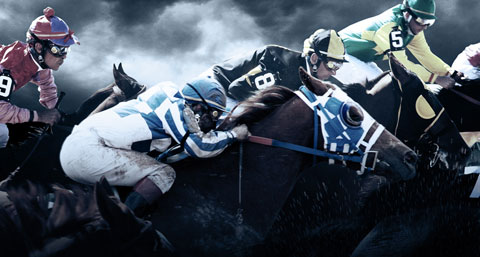
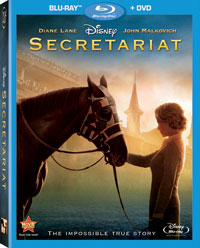
Studio: Buena Vista Director: Randall Wallace Cast: Diane Lane, John Malkovich, Nelsan Ellis, Otto Thorwarth, Margo Martindale, Dylan Walsh, Dylan Baker, James Cromwell, Scott Glenn, Nestor Serrano, Fred Dalton Thompson Length: 123 minutes Rated: PG Video: Audio: Subtitles: 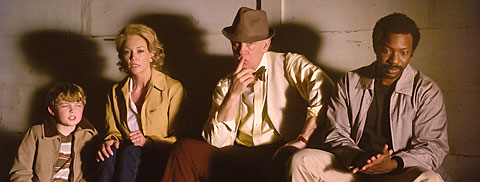
|
Bookmark:
![]() del.icio.us
del.icio.us
![]() Reddit
Reddit
![]() Google
Google
Reader Comments
| Send this Page | Print this Page | Report Errors |


Posted Jul 3, 2011 8:12:16 PM
By gtw